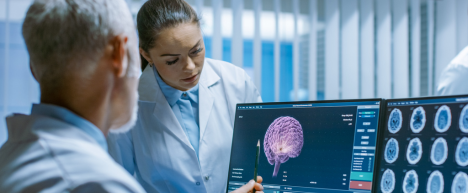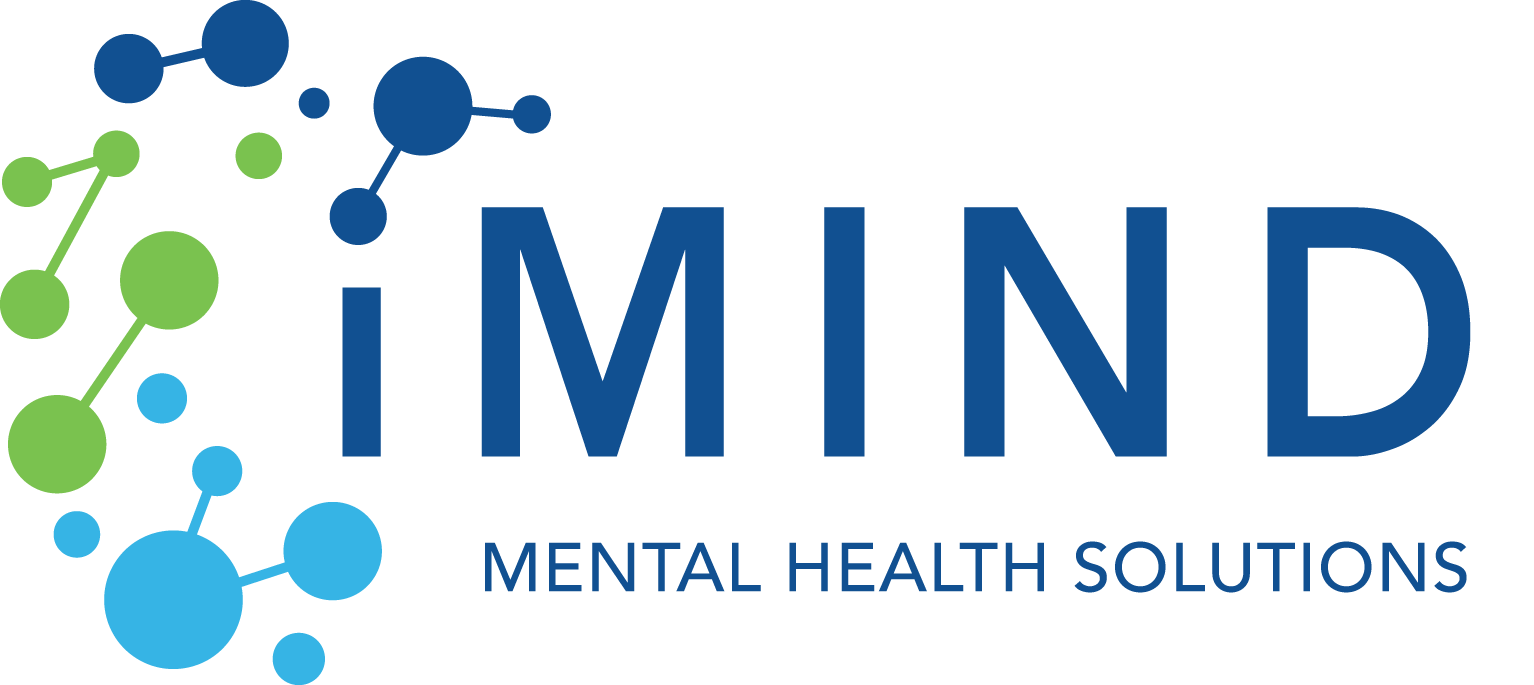What is Integrative Psychiatry? How Can it Help You?
iMind Mental Health Solutions Resource

Integrative psychiatry is like gardening – it is not just about dealing with the weeds (symptoms), but also nurturing the soil (overall health), providing the right nutrients, and understanding the environment’s role in growth. With this approach, mental health is viewed as part of a whole system, encompassing mind, body, and lifestyle.
Integrative Psychiatry vs. Conventional Psychiatry
Integrative psychiatry looks at the entire picture of a person’s life. It is not just about what is going wrong. It is about understanding all the factors that affect mental health – including diet, exercise, sleep, relationships, and work-life balance.
This approach blends traditional psychiatric methods like medication and talk therapy with complementary therapies. These might include nutritional counseling, mindfulness meditation, yoga, acupuncture, and more. Each treatment plan is tailored specifically to the individual, recognizing that what works for one person might not work for another.
Integrative Psychiatry
- Looks at the entire picture of health
- Takes into consideration lifestyle factors such as diet, exercise, and more
- Blends traditional psychiatric methods with complementary therapies such as nutritional counseling, yoga, and acupuncture
- Treatment plans tailored to the individual
Traditional Psychiatry
- Focuses on diagnosing mental health conditions
- Main goal is reduction of symptoms
- Offers medication and talk therapy along with other evidence-based treatments covered by insurance such as TMS and Spravato
- Treatment plans are generally similar among individuals with the same diagnosis
Conventional psychiatry, on the other hand, is like a traditional medical clinic focused mainly on treating symptoms. It’s primarily concerned with diagnosing mental health disorders and often relies heavily on medication and psychotherapy to manage these conditions. The main goal is to reduce or eliminate symptoms of mental health disorders, primarily through medications such as antidepressants, antianxiety drugs, or other psychiatric medications.
Conventional psychiatry treatments are often based on established protocols and guidelines for specific disorders. These treatments are generally similar for all patients with the same diagnosis. Conventional psychiatry also incorporates psychotherapy, such as cognitive-behavioral therapy, but usually without integrating alternative therapies.
Integrative psychiatry doesn’t dismiss the benefits of traditional psychiatric treatments. Instead, it adds more tools to the kit, aiming for a more comprehensive and personalized approach to mental health care.
The Holistic Approach: Mind, Body, and Environment
The holistic approach to health considers the mind, body, and the environment and works to provide an integrative approach to treatment.

The Mind
Integrative psychiatry aims to restore emotional wellbeing of individuals. This aspect emphasizes managing stress, coping with negative thoughts, and fostering positive emotions. It is about keeping your mental and emotional state in good health.
A key treatment modality here is mental activity. Keeping the mind active and stimulated through learning, creativity, and problem-solving is an essential part of maintaining mental health.

The Body
Integrative psychiatry aims for optimum physical health as well. This includes nutrition, exercise, and sleep. Eating healthy, exercising, and getting enough rest are fundamental to keeping your body in good shape.
Just like any physical system, the body sometimes needs medical attention, which can range from medication and surgery to other forms of therapy as well.

The Environment
Your physical surroundings, including where you live and work, play a significant role in your overall well-being. Therefore, integrative psychiatry takes these into consideration, with practitioners making recommendations as needed.
The people you interact with, and your social network also greatly impact your mental and physical health. Healthy relationships and a supportive community are crucial. Your integrative psychiatry practitioner will want to know about your relationships and social connections, and make suggestions in this arena also.

Integrating All Aspects
The integrative psychiatry approach is about finding the right balance between your mental, physical, and environmental factors. It recognizes that each aspect can affect the others and strives for a state of harmony among them.
Prevention and maintenance are key. A holistic approach is not only about addressing health issues as they arise, but also about regular maintenance and preventative measures to ensure ongoing wellbeing.
In essence, the holistic approach is about viewing health as a comprehensive, interconnected system, where the mind, body, and environment are all seen as equally important parts of the whole, each needing attention and care.
Patient-Centered Care and Individualized Treatment Plans
The importance of patient-centered care and individualized treatment plans lies in their ability to provide more effective, personalized healthcare.
Patient-centered care is built on the concept that no two people are the same. Everyone has their own set of needs, preferences and beliefs. It is about listening to and respecting these individual needs, and involves the patient actively participating in their own care. Instead of just following a doctor’s orders, the patient is encouraged to engage in decision-making, express their concerns, and ask questions. Patient-centered care prioritizes treating the individual as a whole, beyond just managing their symptoms. It considers all aspects of a person’s life that might affect their health, such as their work, family life, and hobbies.
Every patient receives an individualized treatment plan that is specifically designed for them. No one treatment works for everyone, so treatments are customized based on the patient’s unique situation. The development of a care plan is a partnership where both parties work together to find the best path forward.
These plans are not set in stone. They are flexible and can be adjusted and adapted over time as the patient’s needs and circumstances change.
Conventional Treatments in Harmony with Alternative Ones
The combination of conventional and alternative treatments provides a more thorough approach to healthcare. It enables patients to benefit from the proven effectiveness of conventional methods while also enjoying the holistic, long-term advantages of alternative therapies.

Conventional Treatments: Therapy & Medication
Conventional treatments, such as therapy and medication, are widely used because they have been scientifically tested and proven effective for various conditions. These treatments are particularly valuable in managing acute symptoms and addressing immediate health concerns, providing quick relief or stabilization.

Alternative Treatments: Complementary Support
Alternative treatments, like acupuncture, yoga, or herbal supplements, complement conventional care by addressing broader aspects of health and wellness. These methods often focus on prevention, stress reduction, and lifestyle improvements, contributing to long-term health and wellbeing.

Integrating Both for Holistic Care
By integrating both conventional and alternative treatments, mental healthcare providers can create care plans designed specifically for the individual, considering their specific health needs and choices. While conventional treatments and lifestyle changes can manage symptoms, alternative therapies can help address underlying causes of health issues, such as lifestyle factors or chronic stress.
Nutritional Psychiatry
Nutritional psychiatry is an emerging science that examines the vital role of good nutrition in mental health. It’s based on the understanding that what we eat significantly influences our brain function and, consequently, our mood, behavior, and mental wellbeing.

Nutritional Balance
Just as our body needs the right fuel to function optimally, our brain requires specific nutrients to operate effectively. Nutritional psychiatry examines how deficiencies or imbalances in our diet can affect mental health, contributing to issues like depression, anxiety, and stress, and whether supplementation may help.
In one study, for example, St. John’s Wort worked as well as and was better tolerated as antidepressants in participants. In another study, rhodiola rosea, an adaptogen, helped with stress tolerance and restoring balance so that individuals could better adapt to their environment.
Recognizing that each person’s nutritional needs and responses are different, nutritional psychiatry assists in creating personalized dietary and supplementation strategies as part of mental health treatment.

The Gut-Brain Connection
The gut-brain connection is the communication link between your brain and digestive system. This link means that your digestive health can directly impact your mental health, and vice versa. Shifts in the makeup of the gut’s microbiome, a complex community of microorganisms in our digestive system, play a role in a range of mental health conditions, notably anxiety, depression, and autism spectrum disorders.

Probiotic and Prebiotic Treatments
Probiotics are live bacteria contained in specific foods and supplements. They are helpful in restoring the natural balance of gut bacteria, potentially improving mental health. Prebiotics are a type of fiber that the human body cannot digest. They serve as food for probiotics and are key in keeping your gut healthy.

Gut Health Strategies
As part of an integrative psychiatric treatment plan, a practitioner may advise patients to prioritize gut health. There are several key ways to do this.
- Eating a diet rich in fruits, vegetables, whole grains, and fermented foods
- Limiting the intake of gut-microbiome-disrupting processed foods, sugars, and antibiotics
- Regular exercise
- Adequate sleep
- Stress management

Metabolic Syndrome and Its Impact on Mental Health
Metabolic syndrome is a cluster of conditions including high blood pressure, high blood sugar, excess body fat around the waist, and abnormal cholesterol levels. These factors increase the risk of heart disease, stroke, and type 2 diabetes.
There’s a growing body of evidence suggesting that metabolic syndrome is linked to an increased risk of mental health issues, such as depression and anxiety. The biological and hormonal imbalances associated with metabolic syndrome can affect brain function and mood.

Low Carbohydrate/High Fat Diets
To combat metabolic syndrome, many health professionals recommend a diet low in carbohydrates and high in healthy fats. The goal is to reduce the intake of sugars and starches, which can spike blood sugar levels, and increase the intake of fats that provide sustained energy.
This dietary shift can have a positive impact on mental health. By stabilizing blood sugar levels, it can lead to improved mood and energy levels. Additionally, healthy fats are essential for brain health, as they play a key role in brain structure and function.
A specific version of this dietary approach is the ketogenic diet, which involves drastically reducing carbohydrate intake and replacing it with fat, leading the body into a state of ketosis. Ketosis is a metabolic state in which your body uses fat, rather than carbohydrates, for fuel.
Spirituality and Mental Health
Spirituality, which can involve personal beliefs, practices, and a sense of connection to something greater than oneself, often plays a significant role in emotional and psychological wellbeing. For many, spiritual beliefs and practices provide a sense of purpose, peace, and comfort. Spirituality can serve as an important coping mechanism, offering solace and guidance during difficult times, offering solace and guidance. It also helps to increase resilience and provide a more optimistic outlook on life.

Neuroscience and Spirituality
Neuroscience studies how spiritual practices like prayer, mindfulness and meditation affect the brain. Research has shown that these practices can lead to changes in brain areas associated with attention, self-awareness, and emotion regulation and influence neurochemical systems affecting mood and stress levels. This suggests a direct neurological basis for some of the benefits of spirituality.

Spirituality in Holistic Treatment
Integrating spiritual practices into mental health care can complement traditional therapies, offering a more rounded approach to healing and wellbeing. Since spirituality is highly personal and varies greatly among individuals, understanding its role in each person’s life is crucial for providing effective, personalized mental health care.
These practices also influence neurochemical systems in the brain, which can affect mood and stress levels, suggesting a direct neurological basis for some of the benefits of spirituality.
Tailoring Exercise to Mental Health Needs
Just as medical treatments are often tailored to specific conditions, exercise can also be customized to address particular psychiatric symptoms. Different types of physical activity can be more beneficial for certain mental health challenges.
- Exercise for Depression: Aerobic exercises, like jogging, swimming, or cycling, are often recommended. They help improve mood and energy levels by triggering the release endorphins, one of the ‘feel-good’ hormones.
- Exercise for Anxiety: Mindfulness activities, such as tai chi or yoga, can be very helpful. The focus on breathing and body awareness, helping to reduce stress and anxiety levels.
- Exercise for ADHD: Exercises that require focus and coordination, like martial arts or team sports, can be beneficial. They help in improving concentration, discipline, and impulse control.
- Exercise for PTSD: Structured, rhythmic activities like walking, running, or dancing can be helpful. They provide a way to process trauma through physical movement while also promoting a sense of control and body autonomy.
- Exercise for Alzheimer’s: Yoga improved mild cognitive impairment, according to a study published in the International Journal of Geriatric Psychiatry.
Regular exercise can generally improve mental health by reducing symptoms like fatigue, enhancing cognitive function, and boosting self-esteem as well.
It’s important to collaborate with healthcare providers or fitness professionals to develop an exercise plan that is safe, effective, and aligned with your mental health needs.
Recent Developments and Ongoing Research in Integrative Psychiatry
Integrative psychiatry is an ever-evolving field, with recent developments and ongoing research continually shaping and expanding its landscape.

Neuroscience and Brain Imaging
Advances in neuroscience and brain imaging technologies are providing deeper insights into how various integrative practices, such as meditation and mindfulness, physically alter the brain. This research is helping to establish a more concrete scientific basis for these practices in mental health care.

Genetics and Personalized Medicine
The growing field of genetics in psychiatry is paving the way for more personalized treatment plans. Researchers are exploring how genetic variations influence mental health disorders and responses to treatments, aiming to tailor therapies more precisely to individual genetic profiles.

Digital and Technological Innovations
The use of digital tools, such as apps for mindfulness and stress reduction, biofeedback, and virtual reality therapies, is expanding. These technologies are being researched for their effectiveness in delivering mental health interventions and for their potential to make integrative treatments more accessible.

Psychedelic-Assisted Therapy
There is a resurgence of interest in psychedelic research, with studies exploring the use of substances like psilocybin and MDMA for treating conditions like PTSD, depression, and anxiety. This research is examining the therapeutic potential of these substances in controlled, clinical settings.

Future Outlook
As research progresses, the challenge lies in effectively integrating these findings into clinical practice. This involves training, awareness, and policy changes to ensure that the latest evidence-based integrative approaches are accessible to patients.
The field of psychiatry is increasingly moving towards a collaborative model, where researchers, clinicians, and patients work together to refine and expand integrative psychiatry methods.
Embracing the Journey to Wellness
Integrative psychiatry, with its holistic and personalized approach, offers a beacon of hope for those who may have found traditional methods alone to be insufficient. It’s an invitation to explore a journey of healing that considers all aspects of your being – your mind, body, and the environment in which you live.
If you or someone you know is grappling with mental health issues, consider integrative psychiatry as a pathway to recovery. It’s a journey that respects your individuality, addresses the root causes of your challenges, and harnesses the power of both conventional and complementary therapies. With the support of compassionate professionals and evidence- based practices, integrative psychiatry can help illuminate your path to wellness.
Remember, your mental health is as crucial as your physical health, and taking care of it is not just necessary. It’s empowering. We encourage you to reach out, seek support, and open yourself to the possibilities of a holistic approach to mental wellbeing. Start the journey to a healthier, happier life today.
- Butler, M. I., Mörkl, S., Sandhu, K. V., Cryan, J. F., & Dinan, T. G. (2019). The Gut Microbiome and Mental Health: What Should We Tell Our Patients?: Le microbiote Intestinal et la Santé Mentale : que Devrions-Nous dire à nos Patients? Canadian Journal of Psychiatry. Revue Canadienne de Psychiatrie, 64(11), 706743719874168. https://doi.org/10.1177/0706743719874168
- Eyre, H. A., Siddarth, P., Acevedo, B., Van Dyk, K., Paholpak, P., Ercoli, L., St. Cyr, N., Yang, H., Khalsa, D. S., & Lavretsky, H. (2017). A randomized controlled trial of Kundalini yoga in mild cognitive impairment. International Psychogeriatrics, 29(4), 557–567. https://doi.org/10.1017/s1041610216002155
- Ho, C. S. H., Zhang, M. W. B., Mak, A., & Ho, R. C. M. (2014). Metabolic syndrome in psychiatry: advances in understanding and management. Advances in Psychiatric Treatment, 20(2), 101–112. https://doi.org/10.1192/apt.bp.113.011619
- National Center for Complementary and Integrative Health. (2021). Complementary, Alternative, or Integrative Health: What’s in a Name? NCCIH.
- Varteresian, T., & Lavretsky, H. (2018). Complementary and Integrative Therapies in Psychiatry. Focus: Journal of Life Long Learning in Psychiatry, 16(1), 54–56. https://doi.org/10.1176/appi.focus.20170056
Latest News
-
Are We Overusing the Term Passive Aggressive?
Sometimes people might label behavior as passive-aggressive when it’s actually just indirect communication or avoidance of confrontation. Overusing the term can dilute its meaning and make it less effective in addressing genuinely passive-aggressive behavior.
-
Top 10 Questions About Art Therapy for Mental Health
Art therapy has recently gained recognition for its unique blend of healing therapy and personal expression. Despite its growing popularity, there seems to be some misunderstanding about what art therapy entails, who it can benefit, and how it differs from other forms of therapy.



